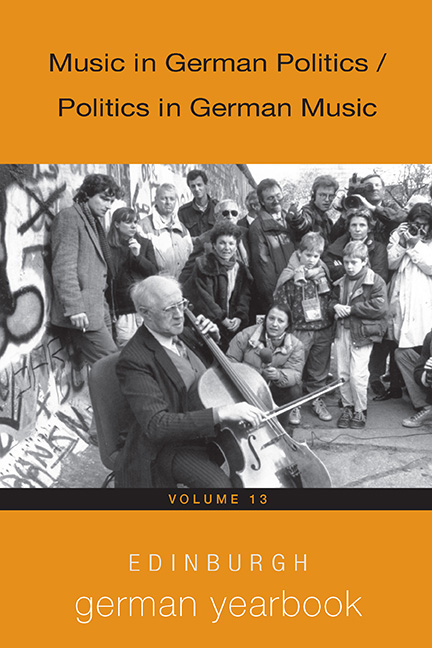The 1848 Revolutionary Lyrics of Hoffmann von Fallersleben, Herwegh, and Freiligrath in the German Folk Song Movement
Published online by Cambridge University Press: 26 May 2022
Summary
THE PROTEST SONGS of the Vormärz and the 1848 Revolution in Germany constitute a broad spectrum of art between the popular and the high: from anonymous satirical street ballads like “Fürsten zum Land hinaus!” (Princes Get Out!), “In dem Kerker saßen” (Sitting in the Dungeons) or “Der Bürgermeister Tschech” (The Mayor Tschech) to classically composed Lieder of established poets such as Ferdinand Freiligrath's “Schwarz-Rot-Gold” (Black-Red-Gold). When the 1848 songs were revived after World War II amidst a wave of rediscovery of German democratic cultural traditions, it was not unanimously agreed that the texts of such “bourgeois” poets as Freiligrath, August Heinrich Hoffmann von Fallersleben, or Georg Herwegh should be included. They appeared, for example, in the volume Die Achtundvierziger: Ein Lesebuch für unsere Zeit (Writers of the 1848 Revolution: A Reading Book for Our Time), edited by the Germanist Bruno Kaiser, but not in the seminal volumes Deutsche Volkslieder demokratischen Charakters aus sechs Jahrhunderten (German Folksongs of a Democratic Character from Six Centuries) of the folklorist Wolfgang Steinitz. He did not consider them “Volkslieder” of the ordinary people because they had not undergone a vibrant oral transmission, as experienced by other popular Vormärz and 1848 songs. However, in the folk revivals of West Germany from the mid-1960s onwards, and the GDR a decade later, the songs of Hoffmann von Fallersleben, Herwegh, and Freiligrath were included and, as such, became part of a wider “tradition” of 1848 song. Dressed up in modern musical attire, these became part of a new countercultural song culture in the conservative Adenauer age of the Wirtschaftswunder (economic miracle) and later in the New Social Movements. In the GDR too, from the late 1970s onwards, folk groups seized upon the socially critical songs of Herwegh, Freiligrath, and Hoffmann von Fallersleben to expose the contemporary lack of democracy.
From the mid-1960s onwards the wider 1848 song tradition was reinvented for popular consumption in the context of a new democratic nation-building in both German states. Singers, musicians, publishers, educationalists, and the record-buying public actively participated in this. In the process a cultural memory of the 1848 Revolution was forged to which the poems and songs of Herwegh, Freiligrath, and Hoffmann von Fallersleben contributed greatly.
- Type
- Chapter
- Information
- Edinburgh German Yearbook 13Music in German Politics/Politics in German Music, pp. 35 - 54Publisher: Boydell & BrewerPrint publication year: 2022

